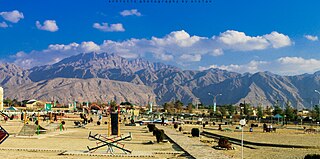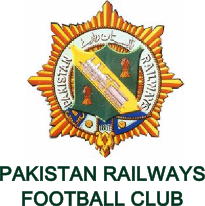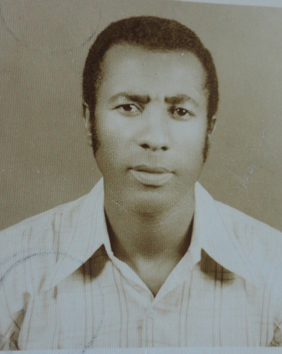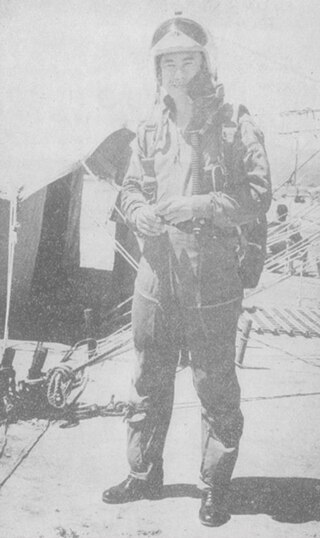
Quetta is the capital and largest city of the Pakistani province of Balochistan. It is the tenth largest city in Pakistan, with a population of over 1.6 million. It is situated in the south-west of the country, lying in a valley surrounded by mountains on all sides. Quetta is at an average elevation of 1,680 metres above sea level, making it Pakistan's highest altitude major city. The city is known as the "Fruit Garden of Pakistan" due to the numerous fruit orchards in and around it and the large variety of fresh and dried fruits produced there.

The Pakistan national football team represents Pakistan in men's international football in FIFA-authorized events and is controlled by the Pakistan Football Federation, the governing body for football in Pakistan. Pakistan became a member of FIFA in 1948 and joined the Asian Football Confederation in 1950.

Pakistan Railways FC serves as the football section of Pakistan Railways, a state-owned railway company. Based in Lahore, the club play at the Railway Stadium. Nicknamed the Railwaymen, they are one of the oldest football clubs in Pakistan and were created by Pakistan Railway workers. The club used to compete in the National Football Championship and Pakistan Premier League. The club regularly participates in the PFF National Challenge Cup.

Afghan Football Club Chaman or simply AFC Chaman, is a Pakistani professional football club based in Chaman, Balochistan, a border city near Afghanistan. The club last competed in the Pakistan Premier League.

Abdul Ghafoor, known by his nickname Majna, was a Pakistani professional footballer who played as a midfielder. Ghafoor also captained the Pakistan national football team. He was nicknamed the "Pakistani Pele" and "Black Pearl of Pakistan".
Lt. Col. (R) Younus Changezi is a politician and former football player and manager. He played for the Pakistan national team from the 1960s till early 1970s, and was later appointed as manager in the 1980s. He also served as a soldier in the Pakistan Army in the 1971 war.

Turab Ali was a Pakistani footballer who played as a centre-back. He was dubbed as "the Wall of China" or "Pillar of Hercules” during his heydays in the 1960s due to his defending abilities.

Qadir Bakhsh, was a Pakistani footballer who played as a midfielder. Nicknamed as Putla, Qadir played in the in the 1960s and 1970s and captained the Pakistan national team on several occasions.

Musa Ghazi was a Pakistani footballer who played as a left winger. He captained the Pakistan national football team during the 1960s.

Air Marshal Sharbat Ali ChangeziHI(M) SI(M) SBt, is a retired three-star air officer in the Pakistan Air Force and a former fighter pilot who led the aerial operations in the Indo-Pakistani War of 1965 and 1971.
The Aga Khan Gold Cup was a tournament played in Dhaka, Bangladesh which invited the top club sides from leading football playing nations of Asia to compete. Many renowned football pundits regard this competition as a predecessor of AFC Champions League, since it was the first organized international competition that involved club teams around Asia. From the late 1950s to the early 1980s, it was a prestigious tournament among Asian clubs.
The Karachi Football League is a city based football league held in Karachi, in Pakistan's Sindh province.
Asghar Ali Changezi is a Pakistani professional Olympian boxer. Changezi participation in 34 National Games and is a National and International Gold medalist (Boxing).
Rajab Ali is a Pakistani footballer who plays as a midfielder for Khan Research Laboratories and the Pakistan national team.

Muhammad Umer was a Pakistani professional footballer, who played as a striker. Umer represented the Pakistan national football team from 1956 to 1968, and was the country's 13th international captain.
The Qayyum Papa Stadium, also known as Qayyum Ali Changezi Stadium, is a football stadium in Mari Abad, Quetta, Pakistan. It has the capacity to accommodate up to 10,000 spectators. The stadium has also been used on occasion to celebrate the Hazara culture day.
Karachi Kickers is a Pakistani football club based in Karachi. Karachi United competed in the Karachi Football League, one of the top leagues of Karachi. It last competed in the 2009–10 PFF League.

Ayub Dar is a former Pakistani footballer, who played as a striker. Ayub represented the Pakistan national team from 1966 to 1975, and was the country's 25th international captain.

Abdul Gafur Baloch was a football player and coach. Born in Pakistan during the British regime, he was granted Bangladeshi citizenship due to his contribution to the country's football.
Pratap Shankar Hazra is a former Bangladeshi national football and hockey player and coach. He is a former national coach of Bangladesh.















